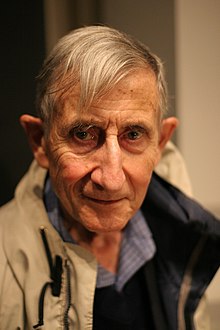A Dyson tree is a hypothetical genetically engineered plant (perhaps resembling a tree) capable of growing inside a comet, suggested by the physicist Freeman Dyson.[1][2][3] Plants may be able to produce a breathable atmosphere within the hollow spaces of the comet (or maybe even within the plants themselves), utilising solar energy for photosynthesis and cometary materials for nutrients, thus providing self-sustaining habitats for humanity in the outer solar system analogous to a greenhouse in space, a shell grown by a mollusc or the actions of thermogenic plants, such as the skunk cabbage or the voodoo lily.[4]
| External image | |
|---|---|

A Dyson tree might consist of a few main trunk structures growing out from a comet nucleus, branching into limbs and foliage that intertwine, forming a spherical structure possibly dozens of kilometers across.
Dyson trees in science fiction
editDyson trees are mentioned a number of times in science fiction, beginning in the 1980s:
- One of the first adoptions of the trope is Rachel Pollack's Tree House (1984).[5]
- The concept is discussed in Carl Sagan and Ann Druyan's 1985 non-fiction book Comet, and several paintings of Dyson trees around Saturn and in interstellar space are provided in the book by Jon Lomberg.[6]
- In Michael Swanwick's 1987 transhumanist novel Vacuum Flowers, "dysonsworlders" have established tree settlements in the Oort Cloud.[7]
- Under the name of "Space Poplars", Dyson trees are described in Donald Moffitt's two science fiction novels, The Genesis Quest and Second Genesis. Here they are used as both habitats and spacecraft, propelled by reflective outer leaves used as organic solar sails.[8][9]
- Dan Simmons, in Endymion (1996) and the Rise of Endymion (1997) – both part of his Hyperion Cantos – refers to Dyson trees, and in the latter novel to a huge tree system that surrounds an entire star (reminiscent of a Dyson sphere).
- In Stephen Baxter's Manifold: Space (2001), Baxter's protagonist Reid Malenfant at one point finds himself inside a Dyson tree.[10]
- In the Orion's Arm shared universe (established 2000), Dyson trees and Dyson tree "forests" are called orwoods; these have been established in a number of star systems throughout terragen space.[11][12] The word "Orwood" in this context was originally coined by Anders Sandberg.[13][failed verification]
- The Transhuman Space roleplaying game includes the beginning of a Dyson tree endeavour on Yggdrasil Station.[14]
- Eclipse Phase Second Edition roleplaying game references the Dyson tree as an example of a Biological Habitat.
- In the Tenchi Muyo OVA series, the Jurai utilize trees that can live in space as ships, and in the temple of the goddess-like character Tokimi, a giant tree whose roots encompass a planet can be seen.[15]
- In The Dirty Pair series, the episode "Run From the Future" is set on the Nimkasi habitat, an outlaw habitat that is a Dyson tree.[16]
- The video game Eufloria is based on the Dyson tree concept.[17]
See also
edit- Bioship – Type of fictional spacecraft or starship made of biological elements
- Dyson sphere – Hypothetical megastructure around a star
- The Integral Trees – 1984 science fiction novel by Larry Niven
References
edit- ^ Basu, SK (2007). Encyclopaedic Dictionary of Astrophysics. Global Vision Publishing. p. 96. ISBN 9788182202207.
- ^ Freeman Dyson, Part I: From Physics to the Far Future. Closer to Truth. Vol. 2101. 9 December 2022. Event occurs at 22:43. Retrieved 1 May 2024 – via YouTube.
- ^ Freeman J. Dyson (November 1997). "Warm-Blooded Plants and Freeze-Dried Fish". The Atlantic. Vol. 280, no. 5. pp. 71–80. Retrieved 1 May 2024.
- ^ Lyra, Wladimir (8 March 2020). "Living in a comet: How to build a Dyson treehouse". Las Cruces Sun-News. Retrieved 2021-05-17.
- ^ Westfahl, Gary (2009). Islands in the Sky: The Space Station Theme in Science Fiction Literature. Wildside. p. 209. ISBN 9781434403568.
- ^ Sagan, Carl; Druyan, Ann (1985). Comet (1st ed.). New York: Random House. ISBN 978-0-394-54908-8.
- ^ Swanwick, Michael (1988). Vacuum flowers. New York: Ace Books. ISBN 0-441-85876-7. OCLC 20956579.
- ^ Moffitt, Donald (2003). The Genesis quest. New York: Ibooks. ISBN 0-7434-5833-8. OCLC 51676877.
- ^ Moffitt, Donald (1988). Second Genesis. Sphere. ISBN 0-7474-0016-4. OCLC 18982814.
- ^ Baxter, Stephen (2000). Space. London: HarperCollins. ISBN 0-00-225771-8. OCLC 43718099.
- ^ Drashner, Todd; Sandberg, Anders; Kazlev, M. Alan (20 November 2001). "Dyson Trees". Orion's Arm - Encyclopedia Galactica. Archived from the original on 7 December 2022. Retrieved 15 June 2023.
- ^ Kazlev, M. Alan (17 December 2001). "Orwoods". Orion's Arm - Encyclopedia Galactica. Archived from the original on 9 December 2022. Retrieved 15 June 2023.
- ^ "Welcome to the Orion's Arm Universe Project". www.orionsarm.com. Retrieved 2021-05-17.
- ^ "Transhuman Space". www.sjgames.com. Retrieved 2021-05-17.
- ^ "Tenchi Muyo OVA Collector's Edition Review • Anime UK News". Anime UK News. 2017-08-04. Retrieved 2021-05-17.
- ^ "The Dirty Pair: Run From the Future (Volume)". Comic Vine. Retrieved 2021-05-17.
- ^ Rose, Mike (2011). 250 Indie Games You Must Play. Taylor & Francis. p. 265. ISBN 9781439875759.
External links
edit- Wladimir Lyra Archived 2023-11-12 at the Wayback Machine, "Living in a comet: How to build a Dyson treehouse". Las Cruces Sun-News, March 2020.
- Dyson Tree – Innovative Technologies from Science Fiction for Space Application.